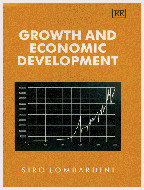Growth and economic development

01.09.1996
Siro Lombardini, Roberto Malaman
Edward Elgar, Series on Economics and the Environment
Growth and Economic Development shows how the different theories of
growth – from the classical to the endogenous growth and Schumpeterian
theories – can be brought together to develop a satisfactory explanation
of the varying rates of growth between countries. A concise survey of
the many theories of growth and development, which provides a context
for understanding how different models can co-exist, is followed by an
explanation of how Solow’s and Lucas’s growth models assess the effects
of technological progress. the author then enlarges Schumpeter’s theory
of economic development by using the theory of natural evolution and
selection. Professor Lombardini uses a simple model to show how
innovation can account for growth and an evolutionary model to determine
conditions in which selection can produce growth. Both theses models
deal with the economy as a whole. In addition, a new method –
computational economics – is used to develop useful generalizations
about the roles of different factors for development.
Growth and Economic Development shows how the different theories of growth – from the classical to the endogenous growth and Schumpeterian theories – can be brought together to develop a satisfactory explanation of the varying rates of growth between countries. A concise survey of the many theories of growth and development, which provides a context for understanding how different models can co-exist, is followed by an explanation of how Solow’s and Lucas’s growth models assess the effects of technological progress. the author then enlarges Schumpeter’s theory of economic development by using the theory of natural evolution and selection. Professor Lombardini uses a simple model to show how innovation can account for growth and an evolutionary model to determine conditions in which selection can produce growth. Both theses models deal with the economy as a whole. In addition, a new method – computational economics – is used to develop useful generalizations about the roles of different factors for development.
